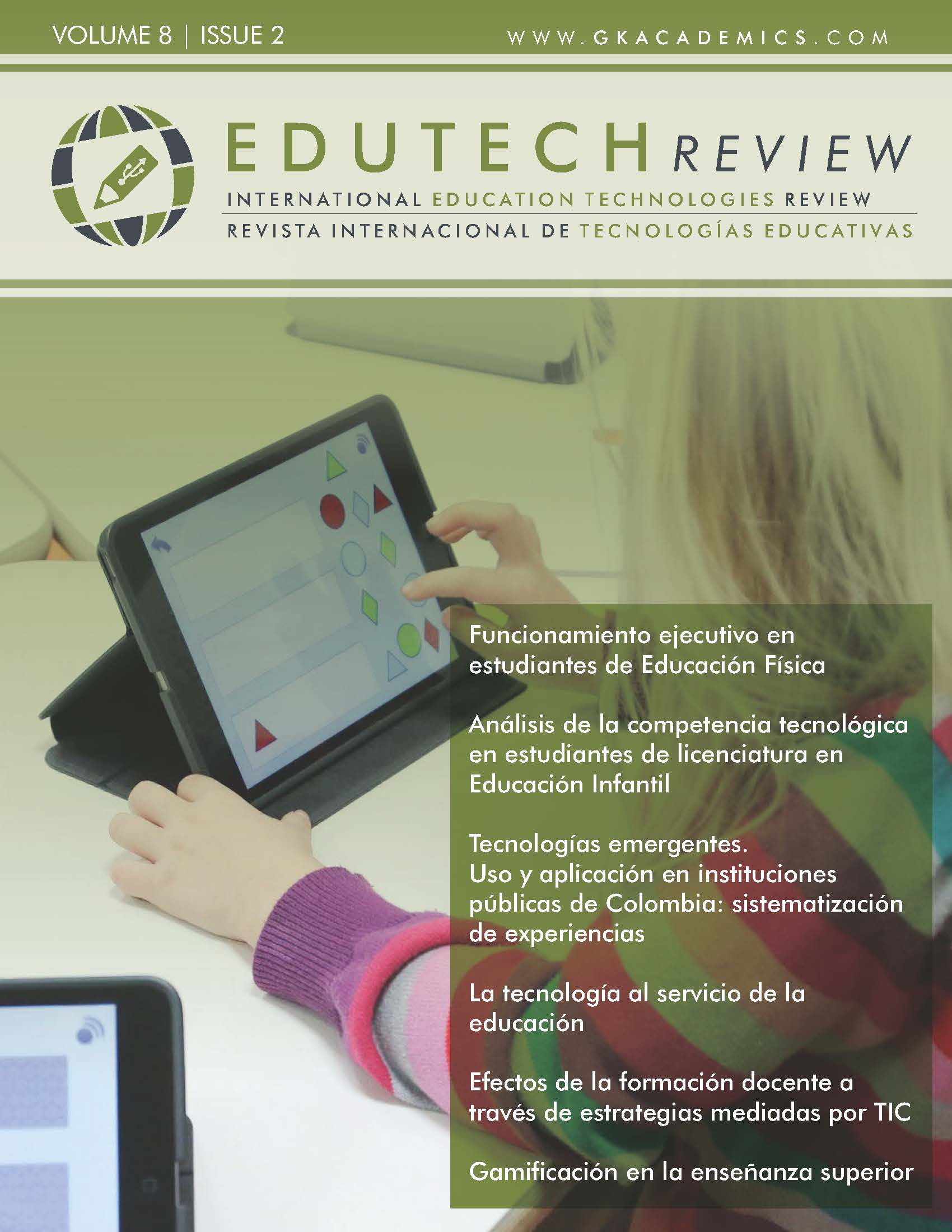Executive Functioning in Physical Education Students
Particularities in contexts virtualized by the pandemic
DOI:
https://doi.org/10.37467/gka-revedutech.v8.2957Keywords:
Executive functions, University students, Learning, PandemicAbstract
The objective is to know and establish some distinctions about how physical education students performed in their learning before the pandemic and now in virtuality. Executive functions were studied. We worked with 46 students who are studying Educational Psychology in Physical Education, from the National University of Río Cuarto, Córdoba, Argentina. An adapted version of EFECO was used (Ramos-Galarza et al., 2016). The results show trends of worse management in times of pandemic regarding monitoring, inhibition, cognitive flexibility, emotional control, initiative, and working memory. In virtuality, difficulties with attention, organization, connectivity, bonds, moods, anguish, and sleep are shown.
Global Statistics ℹ️
|
519
Views
|
151
Downloads
|
|
670
Total
|
|
References
Aguilera-Ruiz, C., Manzano-León, A., Martínez-Moreno, I., Lozano-Segura, M. y Casiano Yanicelli, C. (2017). El modelo flipped classroom. International Journal of Developmental and Educational Psychology, 4(1),261-266. [fecha de Consulta 30 de Junio de 2021]. ISSN: 0214-9877. Disponible en: https://www.redalyc.org/articulo.oa?id=349853537027 DOI: https://doi.org/10.17060/ijodaep.2017.n1.v4.1055
Aragay, X. (2020) ¿Qué estamos aprendiendo los docentes en este nuevo contexto? ¿Que deberían haber aprendido los docentes y las instituciones cuando acabe el confinamiento? (Vivo Instagram) Fundaciòn Grilli. https://www.youtube.com/watch?v=fWSFo8yXLPA&t=10s
Ardila, A. y Ostrosky-Solís, F. (2008). Desarrollo Histórico de las Funciones Ejecutivas. Revista Neuropsicología, Neuropsiquiatría y Neurociencias, 8(1), 1-21
Bermudez Torres, C. y Saenz-López, P. (2019). Emociones en Educación Física. Una revisión bibliográfica (2015-2017) (Emotions in Physical Education. A bibliographic review (2015-2017)). Retos, 36, 597-603. https://doi.org/10.47197/retos.v36i36.70447 DOI: https://doi.org/10.47197/retos.v36i36.70447
Bronfenbrenner, U. (1987). La ecología del desarrollo humano. Experimentos en entornos naturales y diseñados. Barcelona. Paidós
De Jou, G. I. y Sperb, T. M. (2006). A metacognição como estratégia reguladora da aprendizagem [Metacognition as regulatory strategy of learning]. Psicologia: Reflexão e Crítica, 19(2), 177–185. https://doi.org/10.1590/S0102-79722006000200003 DOI: https://doi.org/10.1590/S0102-79722006000200003
De la Barrera, M. L. y Riccetti, A (2020). De decisiones y aprendizajes en la formación de profesores de educación física: poniendo en juego la metacognición. VIREF Revista de Educación Física, 9(3), 63-75
Elisondo, R. C., Melgar, M. F., Chesta, R. C. y Siracusa, M. (2021). Prácticas creativas en contextos educativos desiguales. Un estudio con docentes argentinos en tiempos de COVID-19. Diálogos sobre educación, 22. http://www.dialogossobreeducacion.cucsh.udg.mx/index.php/DSE/article/view/873 DOI: https://doi.org/10.32870/dse.v0i22.873
Fernández-García, L. y Fernández-Río, J. (2019). Proyecto Wonderwall: identificación y manejo de emociones en la Educación Física de Educación Primaria. Retos, 35, 381-386 DOI: https://doi.org/10.47197/retos.v0i35.63259
Merla González, A. y Yáñez Encizo, C. (2016) El aula invertida como estrategia para la mejora del rendimiento académico. Revista Mexicana de Bachillerato a Distancia, 16(8), 68-78 DOI: https://doi.org/10.22201/cuaed.20074751e.2016.16.57108
Pérez Fernández, F. (2004) El medio social como estructura psicológica. Reflexiones a partir del Modelo Ecológico de Bronfenbrenner. EduPsykhé. Revista de Psicología y Psicopedagogía, 3(2), 161-177
Puebla Wuth, R. S. (2009). Las Funciones cerebrales del aprendiendo a aprender (Una aproximación al sustrato neurofuncional de la Metacognición). Revista Iberoamericana De Educación, 50(3), 1-10. https://doi.org/10.35362/rie5031865 DOI: https://doi.org/10.35362/rie5031865
Ramos-Galarza, C., Jadán-Guerrero, J., García-Gómez, A. y Paredes, L. (2016). Propuesta de la escala EFECO para evaluar las funciones ejecutivas en formato de auto-reporte. CienciAmérica, 5(1), 104-109
Reyes Rodríguez, A., Reyes Rodríguez, A. y Reyes Rodríguez, C. (2020). Dispositivos que median las relaciones en la clase de educación física. Revista de estudios y experiencias en educación, 19(41), pp. 71-86. DOI: https://doi.org/10.21703/rexe.20201941reyes5 DOI: https://doi.org/10.21703/rexe.20201941reyes5
Rigo, D., Riccetti, A. Siracusa y Paoloni, P. (2019) Tres experiencias sobre clases invertidas para promover el compromiso por el aprendizaje. Percepciones de estudiantes universitario. Revista Páginas de Educación, 12(2). DOI: https://doi.org/10.22235/pe.v12i2.1836 DOI: https://doi.org/10.22235/pe.v12i2.1836
Rigo, D., de la Barrera, M. L y Travaglia, P. (2020). El aula como entorno clave para el desarrollo de las funciones ejecutivas. Revista Perspectivas Docentes, 72, 9-17. México, Tabasco. http://revistas.ujat.mx/index.php/perspectivas, DOI: 10.19136/pd.a31n72.3423 DOI: https://doi.org/10.19136/pd.a31n72.3423
Torres Aguilar, X. (2020). Las neurociencias, una oportunidad de formación para el docente de educación física. VIREF Revista de Educación Física, 9(3), 116-121.
Weil, L., Fleming, S., Dumontheil, I., Kilford, E., Weil, R., Rees, G., Dolan, R., & Blakemore, S. (2013). The development of metacognitive ability in adolescence. Consciousness and Cognition, 22, 264–271 DOI: https://doi.org/10.1016/j.concog.2013.01.004
Downloads
Published
How to Cite
Issue
Section
License
Copyright (c) 2021 EDUTECH REVIEW. International Education Technologies Review

This work is licensed under a Creative Commons Attribution-NonCommercial-NoDerivatives 4.0 International License.
Those authors who publish in this journal accept the following terms:
- Authors will keep the moral right of the work and they will transfer the commercial rights.
- After 1 year from publication, the work shall thereafter be open access online on our website, but will retain copyright.
- In the event that the authors wish to assign an Creative Commons (CC) license, they may request it by writing to publishing@eagora.org







